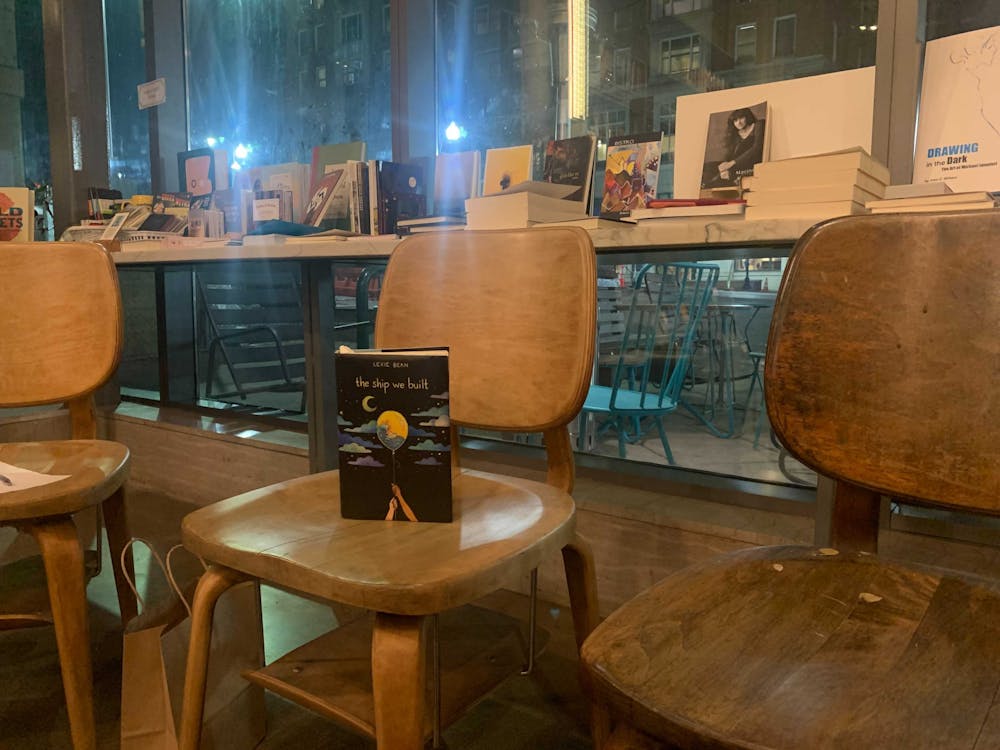The Sexual Assault Resource Unit (SARU) hosted its annual SARU’s Night Out event on Feb. 10.
The event was a table reading of queer and trans multimedia artist Lexie Bean’s debut novel The Ship We Built. The book is made up of letters written by 10-year-old trans boy Rowan about his life, covering subjects such as how he navigates his connections with others, his treatment while trans at school, his mother’s neglect and his father’s sexual abuse.
Bean commented on the process and emotions they went through while writing the book, which took six years.
“I had a shift when I was working on [the book]. Before, I thought having PTSD [post-traumatic stress disorder] was a bad and annoying thing because it so often took me out of reality,” he said. “In revisiting Rowan’s imagination, it’s made me feel kinder to myself because I think it’s my body’s way of believing in a better world.”
Bean centered the experiences of trans and queer survivors through the event.
“People have this idea that being abused means trans, or queerness in general — but really, no,“ they said. “It made my coming out process way harder because why would I trust myself? Why would I trust my body, my impulses as an abuse survivor?”
In between the three chapter readings, Bean engaged the audience with varying activities. For the first activity, participants were given a pen and paper and encouraged to write 10 things that they love and 10 things they remember.
Those who were comfortable sharing anonymously gave their list to another participant and received someone else’s list. For another activity, participants were encouraged to write their own letters in response to Rowan.
In an interview with The News-Letter, Eleanor Franklin, co-director of SARU and one of the organizers of the event, discussed the premise of SARU’s Night Out and why the organization chose to feature Bean.
“For all speaker events in general, we try to have sort of fun more positive events because obviously [SARU] focuses on sexual violence,” they said. “So a lot of the speakers we bring in will be a lot more fun and light-hearted and focused on sexual healing and well-being.”
Franklin added that the book appeals not just to children but also to adults who have experienced sexual abuse. They noted that for survivors of abuse, reading fiction written by a survivor can make survivors feel validated and visible, which in turn contributes to healing.
Franklin also reflected on the energy during the reading. They noted that this event was less formal, softer and more comfortable, allowing people more time to process and interact with the material.
Senior Sonomi Oyagi, another organizer of the event, discussed how having an open space impacted her. They touched on how the activities and interactive format of the event made them feel more comfortable in feeling confused or unsure about things.
“The specific sections that were read of the book really brought me back in touch with memories I had as a child,” she said. “I think I’m often frustrated when I’m feeling confused; that's something that I still experience, but I think listening to these different excerpts and engaging with these activities left me feeling like I should have more caring for my past self.”
Freshman Thành Đoàn reflected on his takeaways from the event in an interview with The News-Letter.
“I felt vulnerably grateful after listening to Lexie Bean,” he said. “To be a sexual assault survivor is to be gentle with yourself firstly, to allow yourself the ability to feel and express, to feel safe.”
Bean spoke to the pressure on survivors to have to remember everything, especially if substances are involved or if they are survivors of childhood sexual abuse.
Furthermore, he discussed how the people survivors are often encouraged to turn to for help, like parents and police, can be the ones perpetrating the harm. For him, pathways of protection involve abolition and support outside of the police state.
Franklin reflected on this perception of relying on law enforcement to deal with sexual abuse cases.
“It was enlightening to think about the idea of there being more literature about survivorship — to have it be normalized as something that people can intimately understand and not have to be something you can only understand if you experience it — [which] might improve the way people react to it,” they said. “If it’s a more widespread problem, it can be viewed as a health problem rather than a criminal one.”
Franklin also discussed how organizing the event was difficult due to COVID-19 procedures.
“Hopkins is always really annoying about approving our events and space and things,” they said. “I don’t know if that’s everybody’s experience, but that’s ours, especially since coming back in person after COVID.”
COVID-19 has also inhibited some students from fully experiencing the University. Sophomore Alara Kaplanoglu discussed why she decided to attend the event and how grateful she was for it.
“It's actually one of the first times I'm coming to an event like this at this school,” she said. “I just still felt disconnected from the school because my freshman year was just fully online. Now, I'm finally trying everything out and adjusting to the school and everything it has to offer.”





